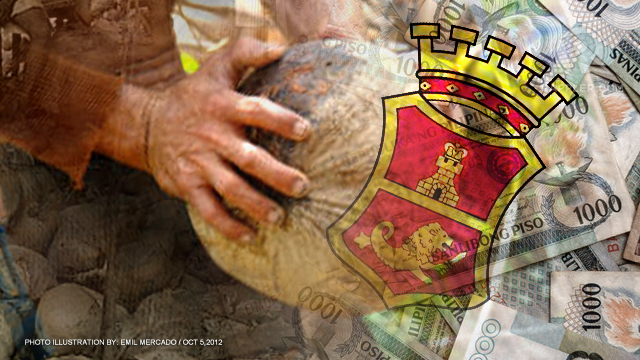SUMMARY
This is AI generated summarization, which may have errors. For context, always refer to the full article.

MANILA, Philippines – Several coconut farmer groups are set to file Wednesday, October 10, a joint petition before the Office of the Ombudsman seeking a probe into the alleged anomalous conversion of the government’s 24% stake in diversified conglomerate San Miguel Corp.
In a 14-page petition, a copy of which was obtained by Rappler in advance, the groups are asking the Ombudsman to investigate the “apparent coordination, conspiracy and collusion” among the officials who applied for and approved the conversion of the stake, equivalent to about 700 million San Miguel common shares, into preferred shares.
The groups — led by Adelmo Arandela of the Nagkakaisang Ugnayan ng mga Magsasaka at Manggagawa sa Niyugan and Luisita Zarsadias-Esmao of Lakas ng Kababaihan sa Kanayunan — alleged that the government lost P16 billion revenues as a result of the conversion.
The groups want probed the “liabilities” of the people involved in the sale, namely:
- board of directors of the Philippine Coconut Producers Federation Inc, “upon whose initiation and instigation the perversion of the converted shares was applied for;”
- former Presidential Commission on Good Government (PCGG) chairman Camilo Sabio;
- PCGG commissioners Narciso Nario, Teresio Jaiver and Jaime Bautista;
- former finance secretary Margarito Teves;
- former Development Bank of the Philippines president Reynaldo David; and
- former solicitor-general Agens Devanadera.
The groups are also asking the Ombudsman to investigate the possible involvement of former President Gloria Macapagal-Arroyo.
The preferred shares, which were awarded by the Supreme Court to the government in a recent final ruling, were bought back by the San Miguel board in September.
San Miguel formally turned over the payment for the shares to the government this month.
‘No due diligence’
The farmer groups claimed that the move to convert the shares was “devoid of insight, foresight, competence and due diligence.”
They added that officials who allowed the conversion “asserted, in concert, the fatally erroneous premise” that it was the best way to preserve the value of shares.
Quoting parts of an ANC interview with PCGG chair Andres Bautista, the groups said the shares, which were sold at a “locked-in” price of P75 apiece due to the conversion, could have earned P16 billion more if they were sold at the price San Miguel’s common shares are presently trading at, which is P110 apiece.
The groups quoted Bautista as saying: “If you sell the shares now at the price of 110 pesos, you would recover, in our estimate, about 86 billion pesos. But as I’ve said, if you look at the computation of what we received including all the dividends of the preferred shares is about 70 billion pesos. So, there’s a difference of 16 billion pesos.”
The groups therefore concluded that “the clear and unmistakable difference of P16 billion is not the result of hindsight, but rather, the gross lack of insight and foresight.”
Sale
The government on October 5 received P57.6 billion as proceeds from the sale of the preferred shares to the San Miguel board.
The board redeemed the shares using funds it raised from a September issuance of another set of preferred shares worth P80 billion — the largest share offer in Philippine corporate history.
The government’s shares in San Miguel, which were registered under the names of 14 coconut oil milling firms, used to be common shares.
However, the government converted them into preferred in a controversial move before the 2010 elections, taking away their voting rights.
Preferred shares pay higher and consistent dividends, but carry no voting rights.
Common shares, on the other hand, do not promise consistent yields but entitle holders to vote in company matters such as election of the board of directors and approval of business plans.
SC decision
The shares and the 14 coconut firms that held them were sequestered by government after the 1986 Edsa People Power Revolution, triggering a legal battle that spanned over two decades.
The government argued the shares were acquired through funds from the levy collected by the administration of the late dictator Ferdinand Marcos from coconut farmers starting in the mid-70s.
In a Sept. 4, 2012 decision, the Supreme Court ruled with finality that the shares and all the dividends they earned were owned by the government and that their proceeds should be used exclusively for the benefit of the coconut farmers.
The Palace has reconvened a presidential task force to determine how best to utilize the share sale proceeds. – Rappler.com
Add a comment
How does this make you feel?





There are no comments yet. Add your comment to start the conversation.